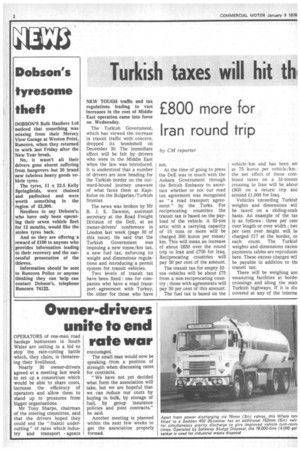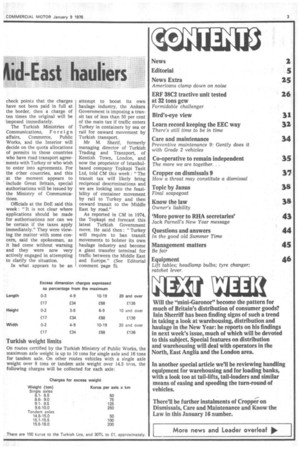£800 more for Iran round trip
Page 4

Page 5

If you've noticed an error in this article please click here to report it so we can fix it.
by CM reporter NEW TOUGH traffic and tax regulations, leading to vast Increases in the cost of Middle East operation came into force on Wednesday.
The Turkish Government, which has viewed the increase in transit traffic with concern, dropped its bombshell on December 30. The immediate effect will be felt by drivers who were in the Middle East when the law was introduced. It is understood that a number of drivers are now heading for the Turkish border on the outward-bound journey unaware of what faces them at Kapikulue on the Bulgarian/Turkish frontier.
The news was broken by Mr R. J. E. Dawson, assistant secretary at the Road Freight Division of the DoE, at an owner-drivers' conference in London last week (page 30 of this issue). He said that the Turkish Government was imposing a new tonne/km tax, a new fuel tax, enforcing its weight and dimensions regulations and introducing a permit system for transit vehicles.
Two levels of transit tax have been fixed : one for companies who have a road transport agreement with Turkey, the other for those who have not.
At the time of going to press the DoE was in touch with the Ankara Government through the British Embassy to ascertain whether or not our road tax agreement was recognised as " a road transport agreement " by the Turks. For reciprocating countries the transit tax is based on the payload of the vehicle. A 32-ton artic with a carrying capacity of 15 tons or more will be charged 300 kurus per tonne/ km. This will mean an increase of about £650 over the round trip to Iran and £750 for Iraq. Reciprocating countries will pay 50 per cent of the amount.
The transit tax for empty 32ton vehicles will be about £75 from a non-reciprocating country ; those with agreements will pay 50 per cent of this amount.
The fuel tax is based on the vehicle ,km and has been set at 75 kurus per vehicle/km; the net effect of these combined taxes on a 32-tonnet crossing to Iran will be about £800 on a return trip and around £1,000 for Iraq.
Vehicles exceeding Turkislweights and dimensions wil: be taxed on a sliding-scalE basis. An example of the tai) is as follows : three per cent over length or over width ; twc per cent over height will bE charged £17 at the border, or each count. The Turkist weights and dimensions exces: payments tables are reproducec here. These excess charges wil be payable in addition to thE transit tax.
There will be weighing an measuring facilities at bordei crossings and along the mair Turkish highways. If it is dis covered at any of the interna check points that the charges have not been paid in full at the border, then a charge of ten times the original will be imposed immediately.
The Turkish Ministries of Communications, Foreign affairs, Commerce, Public Works, and the Interior will decide on the quota allocations of permits to those countries who have road transport agreements with Turkey or who wish to enter into agreements. For the other countries, and this at the moment appears to include Great Britain, special authorisations will be issued by the Ministry of Communications.
Officials at the DoE said this week : "It is not clear where applications should be made for authorisations nor can we be certain if the taxes apply immediately." They were viewing the matter with some concern, said the spokesman, as it had come without warning and they were now very actively engaged in attempting to clarify the situation.
In what appears to be an attempt to boost its own haulage industry, the Ankara Government is imposing a transit tax of less than 50 per cent of the main tax if traffic enters Turkey in containers by sea or rail for onward movement by Turkish transport.
Mr M. Sherif, formerly managing director of Turkish Trading and Transport, of Kentish Town, London, and now the proprietor of Istanbulbased company Topkapi Tasit Ltd, told CM this week : "The transit tax will likely bring reciprocal descriminations and we are looking into the feasibility of container movement by rail to Turkey and then onward transit to the Middle East by road."
As reported in CM in 1974, the Topkapi md forecast this latest Turkish Government move. He said then : "Turkey will require to ban transit movements to bolster its own haulage industry and become a giant transfer terminal for traffic between the Middle East and Europe." (See Editorial comment page 5).




















































































